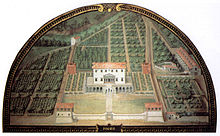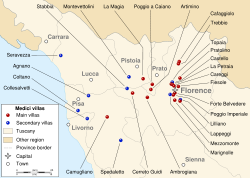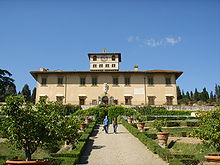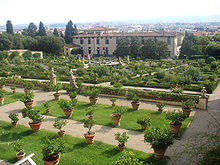- Medici villas
-
For other uses, see Villa Medici (disambiguation).
The Medici villas are a series of rural building complexes near Florence which were owned by members of the Medici family between the 15th century and the 17th century. The villas served several functions: they were the country palaces of the Medici, scattered over the territory that they ruled, demonstrating their power and wealth. They were also recreational resorts for the leisure and pleasure of their owners; and, more prosaically, they were the centre of agricultural activities on the surrounding estates.
Contents
History
 Painting of the Villa Medici di Poggio a Caiano by Giusto Utens
Painting of the Villa Medici di Poggio a Caiano by Giusto Utens
The first Medici villas were the Villa del Trebbio and that at Cafaggiolo, both strong fortified houses built in the 14th century in the Mugello region, the original home of the Medici family. In the 15th century, Cosimo de' Medici built villas designed by Michelozzo at Careggi and Fiesole, still quite severe buildings, but with additional recreational spaces: courtyards, balconies, and gardens. Lorenzo de' Medici spent long periods at the Villa di Careggi. Gradually, Florence became surrounded by a collection of Medici villas, with others in more distant parts of the Grand Duchy of Tuscany. By the end of the 16th century, there were at least 16 major estates, with at least another 11 of secondary interest (mainly agricultural or owned by the Medici family for a short time), together with a constellation of farms and hunting lodges throughout Tuscany. Giusto Utens painted a series of lunettes depicting the main Medici villas in the 17th century, which are now held by the Museo di Firenze com'era.
The last Medici villas were the Villa di Montevettolini and the Villa di Artimino, bought in 1595/6 by Ferdinando I while he was expanding the Villa di Castello, Villa La Petraia and Villa dell'Ambrogiana.
The later villas are outstanding examples of Renaissance and Baroque architecture, and were often accompanied by gardens. The garden at the Villa di Castello, created for Cosimo I de' Medici, Grand Duke of Tuscany, was the first in Italy by Niccolò Tribolo, who later designed the Boboli Gardens for Cosimo's Florentine new residence, the Palazzo Pitti.
Each significant member of the Medici family owned an estate. The Duke moved from one house to house. When in residence, the villa became a microcosm of the Medici court. For hunting, he could visit the Villa del Trebbio, Villa di Cafaggiolo or Villa di Pratolino; reside at the Villa dell'Ambrogiana in the spring; and move to the Villa di Artimino, to while away the summer in its cooler elevated position.
After the death of Gian Gastone de' Medici in 1738, the Grand Duchy of Tuscany and the Medici's assets, including their villas, were acquired by Francis, Duke of Lorraine (later Holy Roman Emperor). Today, some of the Medici villas are museums; others are occupied by institutions, and a few are owned privately, and often hired privately or used to stage public events. In 2006, the Italian government submitted the Medici villas for designation by UNESCO as a World Heritage Site.[1]
List
Major villas
- Villa del Trebbio (mid-14th century - 1738)
- Villa di Cafaggiolo (mid-14th century - 1738)
- Villa di Careggi (1417 - 1738)
- Villa Medici in Fiesole (1450–1671)
- Villa di Poggio a Caiano (1470–1738)
- Villa di Castello (1480–1738)
- Villa di Mezzomonte (1480–1482, 1629–1644)
- Villa La Petraia (first half of the 16th century - 1738)
- Villa di Camugliano (c.1530 - 1615)
- Villa di Cerreto Guidi (1555–1738)
- Villa del Poggio Imperiale (1565–1738)
- Villa di Pratolino (1568–1738)
- Villa di Lappeggi (1569–1738)
- Villa dell'Ambrogiana (1574–1738)
- Villa La Magia (1583–1738)
- Villa di Artimino (1596–1738)
Minor villas
- Villa di Collesalvetti (1464–1738)
- Villa di Agnano (1486–1498)
- Villa di Arena Metato (c.1563 - 1738)
- Villa di Spedaletto (1486–1492)
- Villa di Stabbia (1548–1738)
- Villa della Topaia (c.1550]] - 1738)
- Villa di Seravezza (1560–1738)
- Villa di Marignolle (1560–1621)
- Villa di Lilliano (1584–1738)
- Villa di Coltano (1586–1738)
- Villa di Montevettolini (c.1595 - 1738)
Gallery
In addition to their country villas, the Medici also occupied the following buildings in Florence:
- Palazzo Medici Riccardi (1444–1540, then used by less important members of the family until 1659)
- Palazzo Vecchio (1540 - c.1560)
- Palazzo Pitti (1550–1738)
- Casino di San Marco
and the Villa Medici in Rome.
References
Further reading
- Giardini di Toscana, foreword by Mariella Zoppi, Edifir, 2001
- Alidori Laura, Le dimore dei Medici in Toscana, Edizioni Polistampa Firenze,1995
- Lapi Bini Isabella, Le ville medicee. Guida Completa, Giunti 2003
- Mignani, Daniela (1995) [1991]. The Medicean Villas by Giusto Utens (2nd edition ed.). Florence: Arnaud. ISBN 8880150006.
External links
 Media related to Medici villas at Wikimedia Commons
Media related to Medici villas at Wikimedia Commons- (Italian) Gardens and Villas of Tuscany official website
- (English) Gardens of Tuscany
- Museums in Florence - The Medici VillaVilla of Poggio A Caiano
- Museums in Florence - The Medici Villa della Petraia
Religious sites Battistero | Brancacci Chapel | Orsanmichele | San Lorenzo | San Marco | San Miniato | Santa Croce | Santa Maria del Fiore | Santa Maria Novella | Santo Spirito | Great SynagogueMuseums, galleries, and palaces Notable landmarks Giotto's Campanile | Ponte Vecchio | TheatresGardens and parks Boboli Gardens | Medici villasPeople Institutions Buildings Related Categories:
Wikimedia Foundation. 2010.









